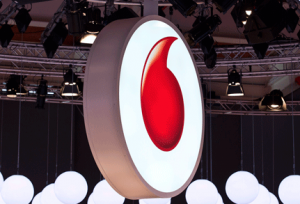
After more than 40 years of operation, DTVE is closing its doors and our website will no longer be updated daily. Thank you for all of your support.
Vodafone sees ‘return to negative growth’ in Germany from MDU TV rule change

Source: Vodafone
The change in German law to prevent housing associations from bundling TV with rental costs will have its “first significant impact” on cable TV leader Vodafone in the current quarter and “a return to negative growth” in the first half of its fiscal 2025 financial year, but all within the “guardrails” the company has previously set.
That at least is the view of the company’s chief financial officer Luka Mucic, speaking on an analyst call as the telecom giant announced its fiscal Q3 numbers.
Mucic, who recently spent some time door-to-door selling to gauge the views of impacted consumers, said that many MDU customers, in his view, would be inclined to stay with their existing TV provider once the law comes into force in July.
“This is not necessarily a customer base that is very OTT-[oriented] by nature. Typically, we’re talking about older people with a certain disposition for staying with the status quo,” he said.
Nevertheless, Mucic said the change would clearly have an impact on Vodafone’s numbers in the quarter to March and on its fiscal 2025 first half.
Many German housing associations renew contracts with tenants in January, meaning that the impact is likely to begin feeding through in the current quarter.
Mucic said that the impact, “regardless of where we end up in the range, will still be quite sizable”, with the expectation that growth in Q4 in Germany will be “roughly flat” and that there will be “a return to negative growth” in the first half of fiscal 2025. However, he said he expected this to mitigated by growth in business revenue and the impact in the second half of the year of a roaming agreement with service provider 1+1.
He said he expected a return to “very decent growth” in fiscal 2026.
CEO Margherita Della Valle meanwhile said that Vodafone, which has previously indicated that the law change will have a significant impact, was “tracking this very closely” and that she was pleased with the “good performance” the company was seeing across sales channels.
Della Valle said that Vodafone was now starting an above the line marketing campaign to win over MDU TV customers “to nudge our customers to take action”.
In its fiscal Q3, Vodafone said it had started migrating end users to individual TV customer contracts at scale.
Vodafone currently has 8.5 million MDU TV households, generating around €800 million in basic-TV revenue annually.
It said that its trials to date have successfully migrated 35% to 65% of these households into individual TV contracts. During Q3 the total TV customer base, including premium TV customers, nevertheless declined by 136,000, taking its total to 12.4 million.
Vodafone’s numbers
German broadband revenue grew by 1% in the quarter with ARPU growth being partially offset by a lower broadband and TV customers base. This followed the extension of a rolling price incrase to a further one million customers in the country. The fixed broadband base declined by 76,000, a smaller decline than in the previous two quarters, while the German converged base increased by 45,000 to 2.4 million.
In Spain, Vodafone’s other main TV market, the company said that its broadband customer base decreased by 24,000, while its mobile contract base increased by 29,000. Service revenue in Spain declined due to price competition, a lower customer base and a reduction in mobile termination rates, partially offset by inflation-lined price increases from last January. Its TV base declined by 18,000 to 1.4 million.
In Italy, where Vodafone has rejected Iliad Group’s offer for its operation, TV numbers declined by 13,000 to 205,000, while in Portugal Vodafone’s local operation increased its TV base by 9,000 to 881,000.
Asked about when Vodafone would be able to give clarity on shareholder returns, Della Valle meanwhile said this would be possible in May on the strength of the €4.1 billion the company expects to receive from the sale of its Spanish operation to Zegona Communications, irrespective of whether it struck a deal in Italy.
Vodafone posted total revenues of €11.4 billion in Q3, up 4%, with service revenue in Germany up 0.3% to €2.9 billion.


